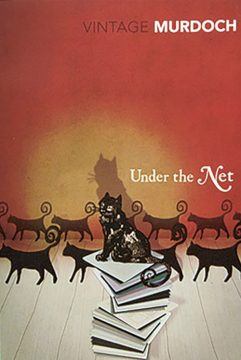by Thomas O’Dwyer
 Mother’s friend departed after their weekly get-together for tea, cakes and gossip, but she forgot to take her book. It was a slim hardback with the blue and yellow banded cover of a subscription book club. It lay on the arm of the sofa for ten minutes and then, before anybody noticed, it vanished – relocated to my bedroom. I was fifteen, and this would be the first adult novel I had ever read. Its title was Under the Net by Iris Murdoch. Iris was my “first” – first adult novelist and first woman writer, and she has remained fixed in my affections over the decades. Under the Net was also Murdoch’s first novel, published in 1954. I was so naively charmed that I made a precocious promise to myself to reread it fifteen years later to see if its appeal lasted. I already knew that in the coming years I would not be rereading my previous favourites, my childhood book collections of Just William, Biggles, Billy Bunter and John Carter’s adventures on Mars. Unlike them, Under the Net had mysteries and ideas I did not yet fathom, but would need to discover.
Mother’s friend departed after their weekly get-together for tea, cakes and gossip, but she forgot to take her book. It was a slim hardback with the blue and yellow banded cover of a subscription book club. It lay on the arm of the sofa for ten minutes and then, before anybody noticed, it vanished – relocated to my bedroom. I was fifteen, and this would be the first adult novel I had ever read. Its title was Under the Net by Iris Murdoch. Iris was my “first” – first adult novelist and first woman writer, and she has remained fixed in my affections over the decades. Under the Net was also Murdoch’s first novel, published in 1954. I was so naively charmed that I made a precocious promise to myself to reread it fifteen years later to see if its appeal lasted. I already knew that in the coming years I would not be rereading my previous favourites, my childhood book collections of Just William, Biggles, Billy Bunter and John Carter’s adventures on Mars. Unlike them, Under the Net had mysteries and ideas I did not yet fathom, but would need to discover.
Dame Iris Murdoch would be 100 years old this July 15 if she had lived to celebrate it, but her brilliant mind faded away in the fog of Alzheimer’s disease and she died twenty years ago in 1999. A recent article in The New York Times lamented that her reputation has also faded with time. “Distressingly, her posthumous reputation is in semi-shambles. Many of her novels are out of print. Young people tend not to have read her. She is seldom taught,” wrote Dwight Garner. Literary reputations are like the actors on Shakespeare’s stage of life, they have their exits and their entrances, but unlike the actors, they can be born again. It is difficult to say if Murdoch’s star is set to rise any time soon. Like many of her 20th-century contemporaries, her novels can seem as ancient as the Victorians. They live in a lifetime before digital watches, never mind computers and the rest of our electronic universe. Few of her characters in their whiteness, snobbery, and obtuseness are people we would find dominant in the streets or cafes of London today. Read more »
